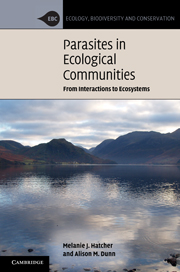Book contents
- Frontmatter
- Contents
- Acknowledgements
- List of abbreviations
- 1 Introduction
- 2 Parasites and competitors
- 3 Parasites and predators
- 4 Parasites and intraguild predation
- 5 Plant pathogens and parasitic plants
- 6 Parasites and invasions
- 7 Ecosystem parasitology
- 8 Emerging diseases in humans and wildlife
- 9 Where do we go from here?
- References
- Index
9 - Where do we go from here?
Published online by Cambridge University Press: 05 August 2012
- Frontmatter
- Contents
- Acknowledgements
- List of abbreviations
- 1 Introduction
- 2 Parasites and competitors
- 3 Parasites and predators
- 4 Parasites and intraguild predation
- 5 Plant pathogens and parasitic plants
- 6 Parasites and invasions
- 7 Ecosystem parasitology
- 8 Emerging diseases in humans and wildlife
- 9 Where do we go from here?
- References
- Index
Summary
A survey of the average date of references cited in this book serves to illustrate how our understanding of the importance of parasites in ecology has developed. We have come from a realisation that parasites can influence competitive interactions between other species (starting with Park's laboratory study of flour beetles in 1948), through the development of ideas for how parasites interact with predation (perhaps exemplified by manipulative field studies on red grouse (Hudson et al., 1992a; 1992b), to recognition of their effects in more complex modules such as intraguild predation (MacNeil et al., 2003c; Borer et al., 2007a; Hatcher et al., 2008). As this ‘pure’ science has evolved, so has its application to real-world scenarios. Along with the application of Hudson et al.'s work to gamebird management, we now recognise the importance of parasites in biological invasions (red squirrels: Tompkins et al., 2003; amphipods: Dunn, 2009; enemy release: Torchin et al., 2003), and in influencing ecosystem function (ecosystem engineering: Thomas et al., 1999; food webs: Lafferty et al., 2008a; bioenergetics: Kuris et al., 2008; carbon balance: Holdo et al., 2009). As this process of exporting basic model systems (theoretical and empirical) to inform our understanding of natural systems has developed, so has the urgency with which we need to tackle an increasing problem: that of emerging infectious diseases.
- Type
- Chapter
- Information
- Parasites in Ecological CommunitiesFrom Interactions to Ecosystems, pp. 386 - 392Publisher: Cambridge University PressPrint publication year: 2011



